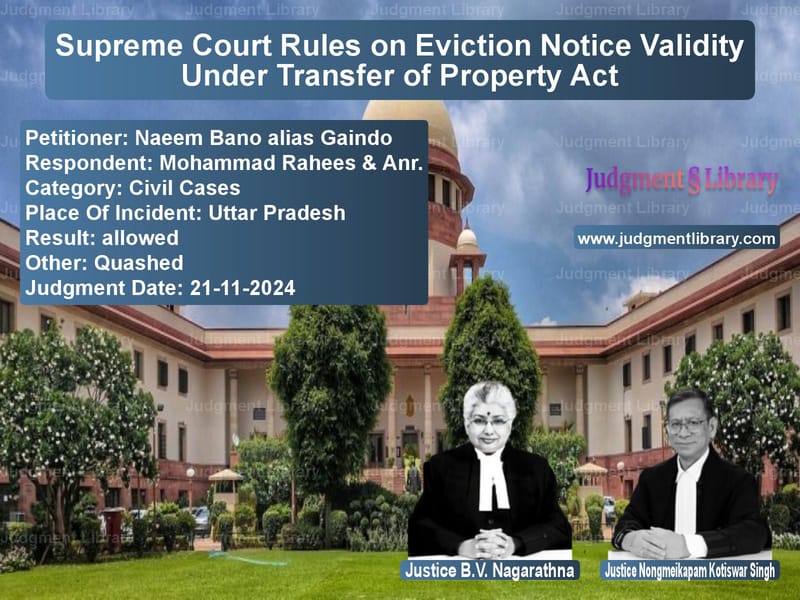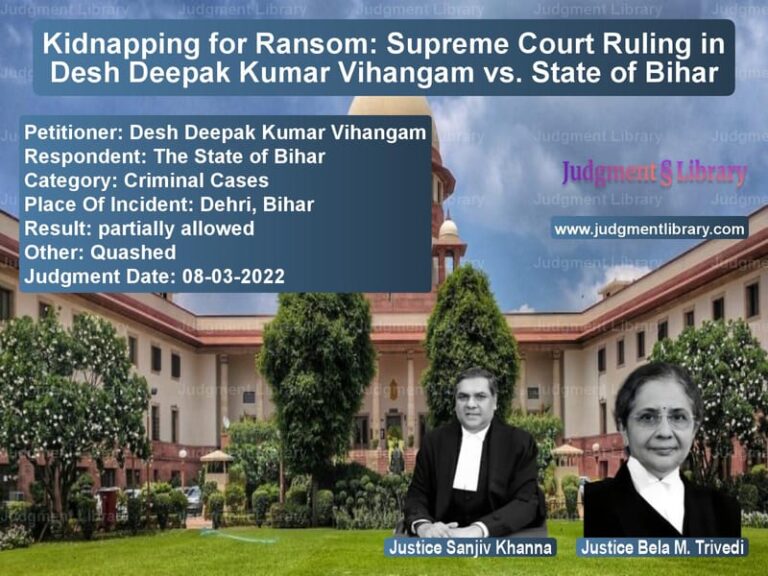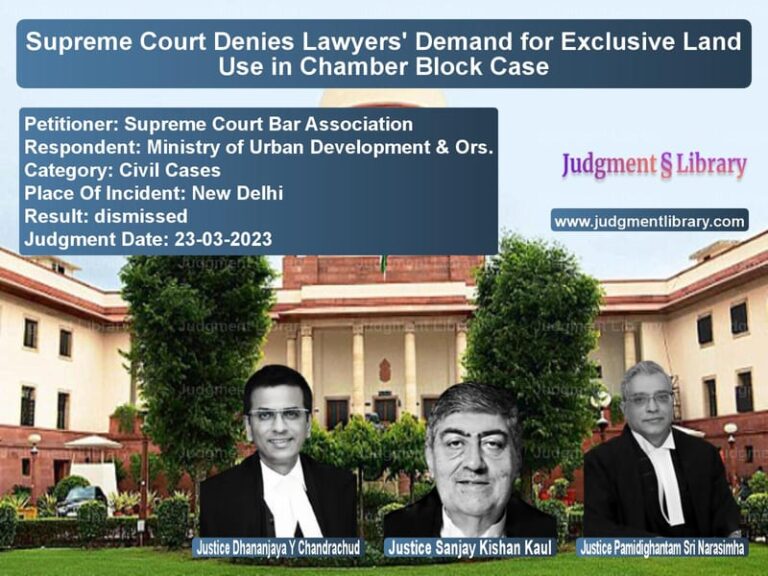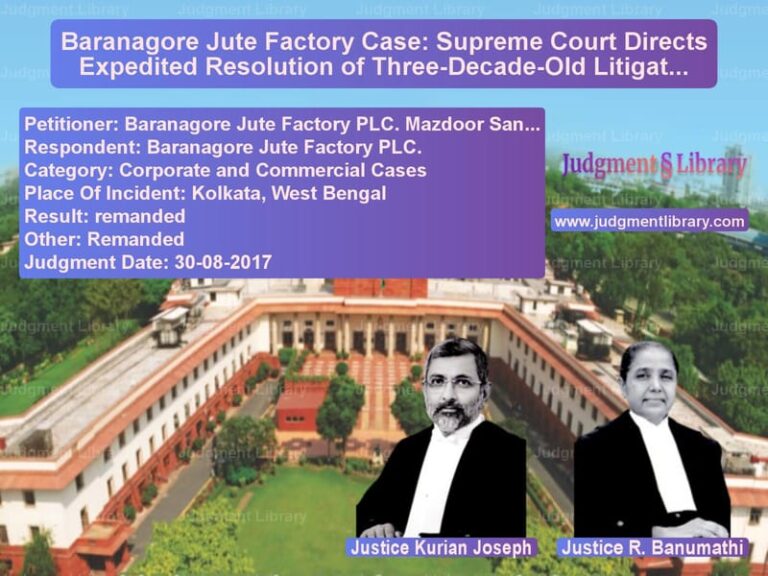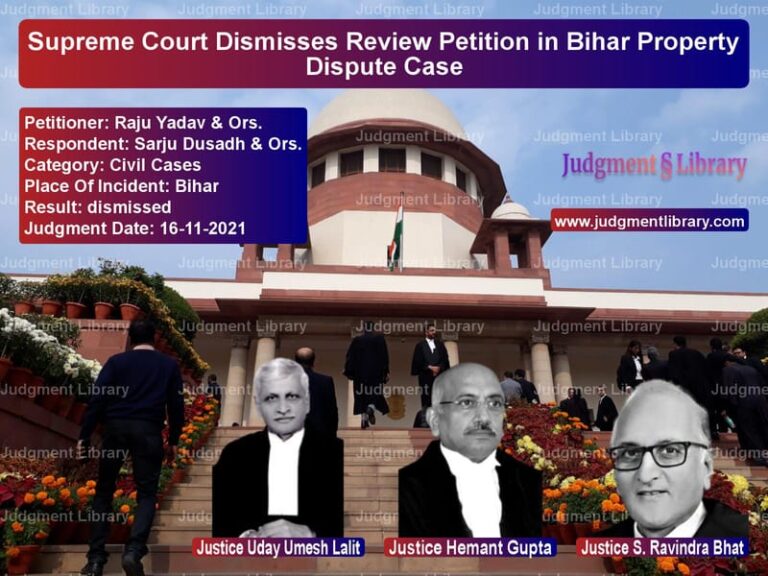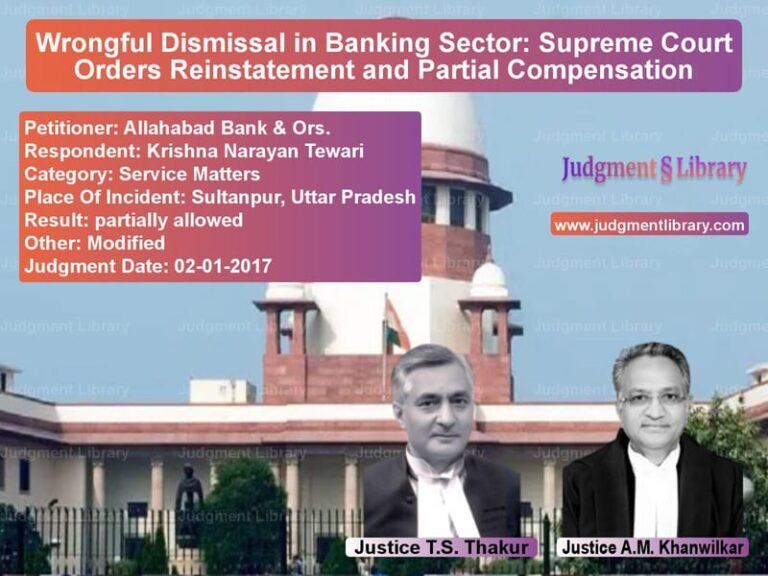Supreme Court Rules on Eviction Notice Validity Under Transfer of Property Act
The case of Naeem Bano alias Gaindo vs. Mohammad Rahees & Anr. revolves around the validity of an eviction notice under Section 106 of the Transfer of Property Act, 1882. The Supreme Court of India, in its judgment dated November 22, 2024, ruled that the amendment made by Parliament in 2003 prevails over the Uttar Pradesh state amendment of 1954, thereby upholding the eviction notice issued under the Central law.
Background of the Case
The dispute arose when the landlord, Naeem Bano alias Gaindo, issued an eviction notice to the tenant, Mohammad Rahees, under Section 106 of the Transfer of Property Act (T.P. Act). The tenant challenged the validity of the notice, arguing that the Uttar Pradesh amendment required a 30-day notice period, whereas the landlord relied on the central amendment, which mandates only a 15-day notice.
The Allahabad High Court deferred the matter, stating that a larger bench was considering a related issue, and continued the interim stay on the eviction proceedings. Aggrieved by the delay, the landlord approached the Supreme Court, seeking a ruling on the validity of the notice.
Key Legal Issues
- Whether the Uttar Pradesh state amendment of 1954, which prescribed a 30-day notice period, is still applicable.
- Whether the Parliamentary amendment to Section 106 in 2003, which reduced the notice period to 15 days, overrides the state law.
- Whether the High Court was correct in delaying the matter pending a larger bench’s ruling.
Petitioner’s Arguments
The landlord, represented by counsel, contended that:
- The 2003 amendment to Section 106 of the T.P. Act, enacted by Parliament, takes precedence over the 1954 Uttar Pradesh amendment.
- Under Article 254(1) of the Constitution, the central law prevails in case of inconsistency between a state law and a central law on a concurrent subject.
- The High Court should not have delayed the eviction case while waiting for another bench’s decision on a similar matter.
- The notice issued under the 2003 amendment was legally valid, and the tenant’s objections were unfounded.
Respondent’s Arguments
The tenant countered with the following points:
- The Uttar Pradesh amendment, having received Presidential assent, continues to be valid under Article 254(2) of the Constitution.
- The tenant had a vested right to receive a 30-day eviction notice as per state law.
- The High Court was justified in awaiting the decision of a larger bench before ruling on the eviction case.
Supreme Court’s Observations
The Supreme Court examined the legislative framework and relevant constitutional provisions, making the following key observations:
1. Central Law Prevails Over State Law
The Court reaffirmed that when a state law conflicts with a central law on a concurrent subject, the central law prevails unless the state law has received Presidential assent and Parliament has not subsequently amended the law. In this case, the Court stated:
Read also: https://judgmentlibrary.com/supreme-court-upholds-specific-performance-of-1986-oral-sale-agreement/
“Article 254(1) of the Constitution makes it clear that if any provision of a law made by the Legislature of a State is repugnant to any provision of a law made by Parliament, the law made by Parliament shall prevail, and the law made by the State shall, to the extent of the repugnancy, be void.”
2. Implied Repeal of Uttar Pradesh Amendment
The Court ruled that the 1954 Uttar Pradesh amendment was rendered ineffective by the 2003 Parliamentary amendment. It observed:
“The Parliament, by enacting the amendment to Section 106 in 2003, has impliedly repealed the Uttar Pradesh amendment of 1954, making the 15-day notice period applicable in the state as well.”
3. Delay by the High Court Unjustified
The Court criticized the High Court for delaying the matter unnecessarily, stating:
“The High Court ought to have proceeded with the case based on settled constitutional principles rather than deferring it indefinitely pending a decision by a larger bench.”
Final Judgment
The Supreme Court ruled in favor of the landlord and held:
- The 2003 Parliamentary amendment prevails, and a 15-day notice is sufficient for eviction under Section 106 of the T.P. Act.
- The High Court’s interim order was set aside, and it was directed to proceed with the eviction case without further delay.
- The tenant’s challenge to the eviction notice was dismissed.
Impact of the Judgment
This ruling has significant implications for tenancy laws in Uttar Pradesh and other states with conflicting state amendments. It ensures:
- Uniformity in the application of the Transfer of Property Act across India.
- Reaffirmation of the principle that central laws override inconsistent state laws.
- Prevention of unnecessary judicial delays in landlord-tenant disputes.
By upholding the validity of eviction notices issued under the central law, the Supreme Court has reinforced the supremacy of Parliamentary legislation in matters of concurrent jurisdiction.
Petitioner Name: Naeem Bano alias Gaindo.Respondent Name: Mohammad Rahees & Anr..Judgment By: Justice B.V. Nagarathna, Justice Nongmeikapam Kotiswar Singh.Place Of Incident: Uttar Pradesh.Judgment Date: 21-11-2024.
Don’t miss out on the full details! Download the complete judgment in PDF format below and gain valuable insights instantly!
Download Judgment: naeem-bano-alias-gai-vs-mohammad-rahees-&-an-supreme-court-of-india-judgment-dated-21-11-2024.pdf
Directly Download Judgment: Directly download this Judgment
See all petitions in Landlord-Tenant Disputes
See all petitions in Property Disputes
See all petitions in Damages and Compensation
See all petitions in Judgment by B.V. Nagarathna
See all petitions in Judgment by N. Kotiswar Singh
See all petitions in allowed
See all petitions in Quashed
See all petitions in supreme court of India judgments November 2024
See all petitions in 2024 judgments
See all posts in Civil Cases Category
See all allowed petitions in Civil Cases Category
See all Dismissed petitions in Civil Cases Category
See all partially allowed petitions in Civil Cases Category

